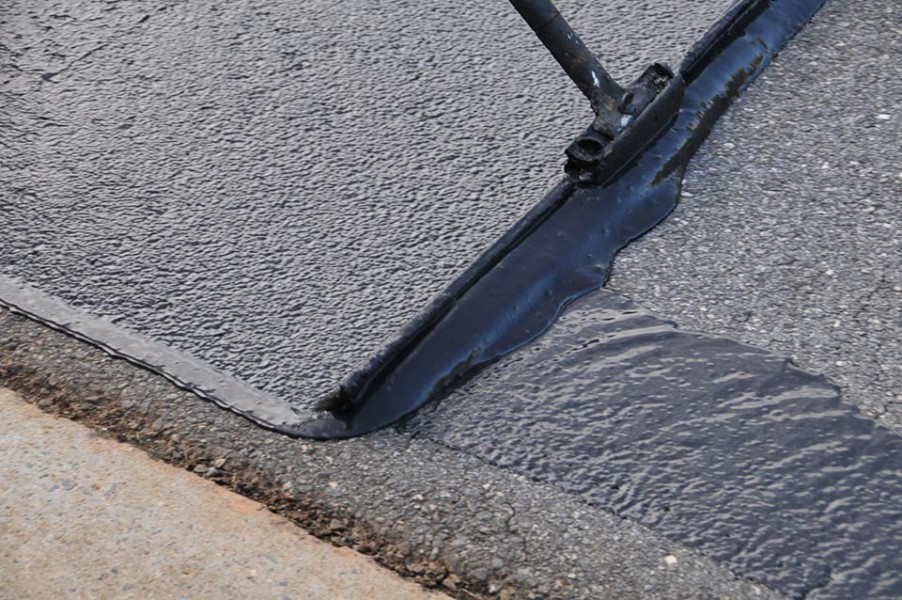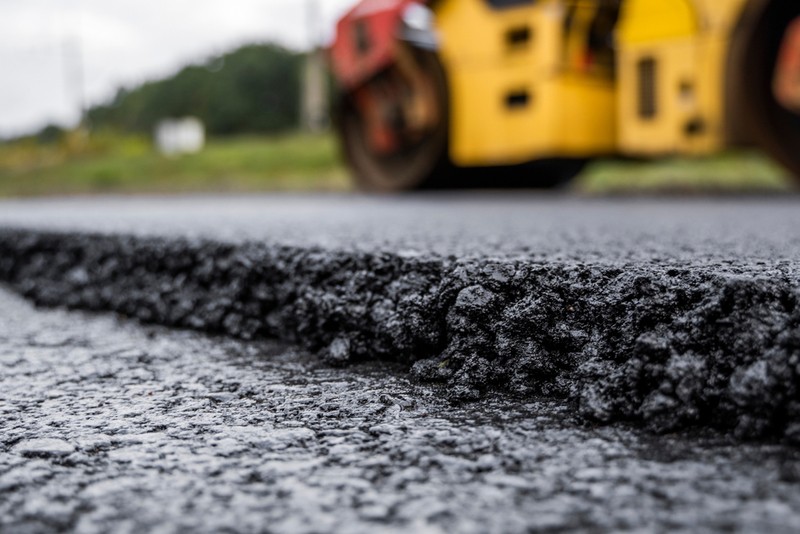Understanding Tilted Parking: How Asphalt Sealing Improves Industrial Great Deals
Understanding Tilted Parking: How Asphalt Sealing Improves Industrial Great Deals
Blog Article
Warm Mix Asphalt: A Lasting Solution for Pavement
Hot Mix Asphalt (HMA) has actually emerged as a leading lasting choice for sidewalk services, supplying a myriad of ecological advantages and innovative technologies. As the need for environment-friendly construction methods expands, checking out the nuances of HMA's sustainability can offer valuable insights into the future of pavement solutions.
Ecological Benefits of Warm Mix Asphalt

Furthermore, Hot Mix Asphalt helps to minimize metropolitan warmth island impacts. Its dark shade soaks up sunshine, reducing the amount of warmth showed back right into the atmosphere contrasted to lighter-colored sidewalks. This can lower ambient temperature levels in urban locations, lowering the need for cooling and ultimately decreasing energy intake.
Additionally, Warm Mix Asphalt adds to enhanced stormwater management. Its permeable nature allows water to penetrate the pavement and recharge groundwater supplies, minimizing drainage and the danger of flooding. These environmental benefits make Warm Mix Asphalt a sustainable choice for leading highways and roads.
Power Efficiency in HMA Production
Is energy efficiency an important variable in the production of Warm Mix Asphalt (HMA)? Definitely. Power plays a significant role in the manufacturing of HMA, influencing both price and ecological sustainability. One vital facet of energy efficiency in HMA manufacturing is using warm mix asphalt (WMA) technologies (hot mix asphalt). WMA enables the blending and positioning of asphalt at reduced temperature levels compared to conventional hot mix asphalt, causing reduced power intake during manufacturing. This process not only reduces gas use however additionally decreases greenhouse gas exhausts, making it a more environmentally pleasant option.
Moreover, innovations in plant modern technologies have caused more energy-efficient HMA production processes. Modern plants are developed with functions like recycled asphalt pavement (RAP) processing capacities, effective burner systems, and enhanced insulation, all contributing to energy savings. By enhancing power use in HMA manufacturing, the sector can lower its carbon impact while preserving high-grade sidewalk materials. Energy effectiveness is, as a result, an essential factor to consider in guaranteeing the sustainability of Hot Mix Asphalt manufacturing.
Recyclability of Warm Mix Asphalt
The recyclability of Warm Mix Asphalt (HMA) is a pivotal element of its sustainability and long-term environmental influence. HMA is just one of the most recycled products in the USA, with over 100 million heaps of recovered asphalt pavement (RAP) being reused yearly in new pavement building. Reusing HMA offers numerous environmental benefits, such as minimizing the demand for virgin products, lowering energy intake during production, and reducing the amount of waste sent to landfills.
The process of recycling HMA entails grating the existing sidewalk, squashing it right into smaller sized items, and mixing link it with brand-new aggregate and asphalt binder to produce a recycled mix. This recycled visit homepage mix can often do as well as and even much better than traditional HMA, while requiring less raw materials and generating reduced greenhouse gas emissions. By integrating RAP right into brand-new sidewalk tasks, roadway firms can save natural deposits, reduce prices, and minimize the ecological footprint of road construction and upkeep activities. In general, the recyclability of HMA plays a significant role in advertising sustainable techniques within the sidewalk industry.

Long-Term Performance of HMA
Asphalt sidewalks show durability and resilience over an extensive period, showing the long-term performance of Warm Mix Asphalt (HMA) Furthermore, developments in HMA innovation, such as the use of polymer-modified binders and cozy mix asphalt, have actually even more improved the durability and longevity of HMA sidewalks. By prioritizing quality building and upkeep techniques, HMA continues to verify itself as a sustainable and affordable option for resilient pavement framework.

HMA: Longevity and Sustainability
Demonstrating both toughness and sustainability, Warm Mix Asphalt (HMA) has ended up being a keystone in the building of resilient pavement infrastructures - commercial parking lot paving. HMA's sturdiness originates from its capacity to hold up against hefty tons, harsh weather, and high traffic volumes, making it a trustworthy option for highways, freeways, and flight terminal runways. The make-up of HMA, which usually includes aggregates, binder, and filler, plays a critical duty in boosting its longevity and resistance to use and tear
Additionally, HMA's sustainability exists in its recyclability and energy-efficient production procedure. The capability to recycle recovered asphalt pavement (RAP) in brand-new HMA mixes minimizes the demand for virgin materials and decreases the environmental effect of pavement building you can try this out and construction and maintenance. In addition, the energy efficiency of generating HMA hinges on its lower blending temperatures compared to other pavement products, leading to lowered power consumption and greenhouse gas discharges.
Conclusion
To conclude, hot mix asphalt (HMA) offers a lasting solution for sidewalk with its eco friendly attributes. HMA's recyclability, energy performance in production, and long-lasting toughness make it a green choice for roadway construction. By conserving natural deposits, reducing waste, and reducing greenhouse gas emissions, HMA plays a crucial function in promoting sustainability in framework development. Its ability to mitigate metropolitan warm island effects additionally emphasizes its relevance in creating eco conscious and resilient sidewalk systems.
HMA is one of the most recycled products in the United States, with over 100 million loads of redeemed asphalt sidewalk (RAP) being reused each year in brand-new sidewalk construction.The procedure of recycling HMA entails milling the existing pavement, crushing it right into smaller sized items, and mixing it with brand-new aggregate and asphalt binder to develop a recycled mix.Asphalt sidewalks show durability and resilience over an extended period, mirroring the long-term performance of Hot Mix Asphalt (HMA) In addition, developments in HMA technology, such as the usage of polymer-modified binders and cozy mix asphalt, have actually further improved the sturdiness and longevity of HMA pavements. The ability to reuse reclaimed asphalt pavement (RAP) in new HMA mixes minimizes the need for virgin products and reduces the ecological effect of pavement construction and upkeep.
Report this page